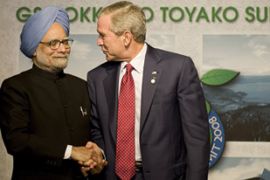Nuclear trade ban with India lifted
The agreement will allow the US and India to proceed with their nuclear pact.

Lobbying
The US needed approval from the nuclear group, which governs the legal trade in nuclear components and technology.
George Bush, the US president, and Condoleezza Rice, the secretary of state, had telephoned counterparts, lobbying them to agree.
The US-India deal still needs approval from the US congress. The president has been trying to get approval before members recess for the year to devote time to re-election campaigns.
Austria issued a statement saying it lifted its objections after India pledged not to touch off a nuclear arms race or share sensitive technology with other countries.
Austria’s government called that pledge “decisive”.
Before the group approved the deal, US officials had contended that selling peaceful nuclear technology to India would bring the country’s atomic programme under closer scrutiny and boost – not undermine – international nonproliferation efforts.
Steadfast commitment
Many members of the cartel, which seeks to prevent the spread of proliferation-prone nuclear fuel and technology, welcomed an Indian pledge rejecting any nuclear arms race and reaffirming a voluntary moratorium on tests.
India issued a statement insisting it had “a long-standing and steadfast commitment to universal, non-discriminatory and total elimination of nuclear weapons”.
The International Atomic Energy Agency (IAEA) approved an India-specific safeguards agreement in August.
But some in the suppliers group felt the commitment was not sufficiently binding.
Six nations had been demanding a clause stipulating an automatic cessation of the waiver if India tested another bomb.
After India’s statement, the group splintered as Norway, the Netherlands and Switzerland indicated they could accept more limited language, diplomats said.